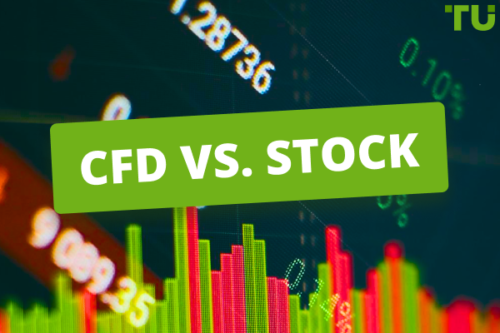Trading in CFD vs Stock exchanges: what’s the difference? In some aspects, trading stock CFDs is comparable to trading stock on the equities exchange. However, there are a few important distinctions to be made. If you’re unfamiliar with financial derivative products like CFDs, the most apparent distinction is that while trading CFDs, you don’t really have ownership of the underlying asset.
What is CFD
For many traders, CFD is an essential part of their overall trading strategy. However, it might be difficult to properly comprehend the benefits and drawbacks of investing in and trading CFDs, especially for traders who are just beginning their trading careers.
Contract for difference, or CFD, is a common technique for new investors to get their feet wet in the financial markets. Forex, commodities, and spot metals brokers all provide this service.
Trading in CFD is a sort of derivative trading. As a result, their value is derived from the movement of an underlying asset. With them, traders may speculate on price swings without having to own the underlying item themselves.
How CFD Work
Profit and loss are determined by comparing the prices at the beginning and the end of a contract. So, if you get into a contract with a broker, or a’seller,’ they will compensate you for any difference in cost between the start and end prices of the deal.If a trader loses money, the “buyer” is responsible for the difference.
What is stock?
Stock represents a portion of a publicly-traded company’s equity. If a shareholder owns a certain percentage of the firm, they are entitled to a share in the assets and earnings generated by the business. On a stock market, such as The Stock Exchange of Hong Kong Limited or the New York Stock Exchange, these shares are exchanged.
Since stocks may rise in value over time, they are often considered long-term investments. Additionally, dividends, which are the company’s profits distributed to investors, might be paid out quarterly, semi-annually, or yearly. However, this differs from business to business and is based on the performance of the company over a year.
CFD vs Stock: Which is Effective?
What is the difference between CFD vs Stock trading and how it works will be simply explained here for those of you who are ignorant.
Ownership
With stocks, you get the actual ownership of the company as represented by the number of stocks. The more stocks you buy, the more ownership you have, and you actually own those stocks.
Stock contracts for different CFDs, on the other hand, do not result in the transfer of ownership of the underlying stock. To put it simply, you are entering into a contract with the CFD provider for the movements of the stock price.
Voting Right
Stockholders normally have one vote per share when it comes to exercising their right to vote. Even though directors have limited voting rights, most day-to-day decisions are still made by the CEO and board members.
With CFDs, there is no direct ownership of the stock, hence there are no voting rights available.
Leverage
For some investors, the huge leverage of stock CFDs makes them more appealing than ordinary equities. Investing in the stock market is a low-risk strategy.
To understand this first, you need to know about leverage. Leverage is simply the ability to take on larger holdings with a smaller investment. As an example, you can acquire $15,000 worth of stock CFDs without ever having to pay for them. As a result, you have more money to use for other investments.
Stock CFDs are considered high-risk, high-reward investments because of their leverage.
Dividends sharing
Often, dividends are given in the form of cash or more shares to shareholders. Their pay is based on how well the business does since it is figured out after taxes and putting money back into the business.
If a company pays dividends, the cash adjustment provided through stock CFDs is not a dividend in and of itself. When a company pays a dividend, a part of the money is usually put into the trading account.
Shortablility
Stocks and stock CFDs may both be used to take short trades. Those who expect a decline in stock prices may choose to sell their holdings and then buy them back at a lower price. Because there are no borrowing expenses, shorting stock CFDs is even more cost-effective.
Risks to be aware of
One of the biggest differences between trading CFDs and stocks is the lack of risk involved. Stamp duty and brokerage fees are two examples of transaction expenses. When you use leverage instead of your own money to trade CFDs, you don’t have to worry about capital gains taxes, which may be a problem when you’re dealing with regular shares. Check out oanda reviews, which is the best CFD broker.
Trading rights
Because you are the owner of the stock, you have more rights as an investor. The degree of protection you get while trading stock CFDs is contingent on the rules of the nation in which you are located or the location of the CFD broker or provider.
Conclusion
As we discussed many aspects of CFD vs stock trading, it is clear that for long-term investing, stocks are clearly superior to stock CFDs. Since there are no rollover fees and the leverage is low, CFDs are a better long-term investment than stocks. Furthermore, since the stock market is regulated by a central body, stocks are safer and provide superior investor protection. It is thus possible to invest a large sum of money. But as usual, diversification of holdings is recommended to mitigate risk.
